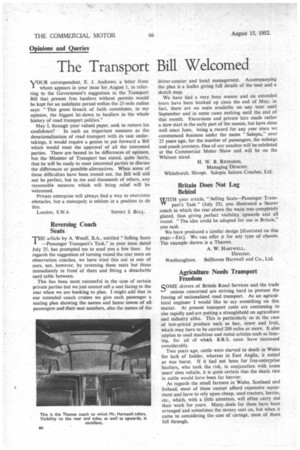The Transport Bill Welcomed
Page 40

If you've noticed an error in this article please click here to report it so we can fix it.
YOUR correspondent, E. J. Andrews, a letter from whom appears in your issue for. August 1, in referring to the Government's suggestion in the Transport Bill that present free hauliers without permits would be kept for an indefinite period within the 25-mile radius says: "This gross breach of faith constitutes, in my opinion, the biggest let-down to hauliers in the whole history of road transport politics."
May I, through your valued paper, seek to restore his confidence? In such an important measure as the denationalization of road transport with its vast undertakings, it would require a genius to put forward a Bill which would meet the approval of all the interested parties. There are bound to be differences of opinion, but the Minister of Transport has stated, quite fairly, that he will be ready to meet interested parties to discuss the differences or possible alternatives. When some of these difficulties have been ironed out, the Bill will still not be perfect, but to me and thousands of others, any reasonable measure which will bring relief will be Welcomed.
Private enterprise will always find a way to overcome obstacles, but a monopoly is seldom in a position to do this.
London, S.W.4. SIDNEY J. BULL
Reversing Coach Seats
THE arlticle by A. Woolf, B.A., entitled "Selling Seats 1 —Passenger Transport's Task," in your issue dated July 25, has prompted me to send you a few lines. As regards the suggestion of turning round the rear seats on observation coaches, we have tried this out in one of ours, not, however, by reversing these seats but those immediately in front of them and fitting a detachable card table between.
This has been most successful in the case of certain private parties but we just cannot sell a seat facing to the rear when we are booking to plan. I might add that in our extended coach cruises we give each passenger a seating plan showing the names and home towns of all passengers and their seat numbers, also the names of the driver-courier and hotel management. Accompanying the plan is a leaflet giving full details of the tour and a sketch map.
We have had a very busy season and on extended tours have been booked up since the end of May; in fact, there are no seats available on any tour until September and in some cases nothing until the end of that month. Excursions and private 'hire made rather a slow start in the early part of the season, but have done well since June, being a record for any year since we commenced business under the name " Salopia," over 25 years ago, for the number of passengers, the mileage and coach journeys. One of our coaches will be exhibited at the Commercial Motor Show and will be on the Whitson stand.
H. W. B. RICHARDS,
Managing Director, Whitchurch. Shrops. Salopia Saloon Coaches, Ltd.
Britain Does Not Lag Behind
wax your article, "Selling Seats—Passenger Transport's Task" (July 25), you illustrated a Saurer coach in which the rear above the waist was completely glazed, thus giving perfect visibility upwards and all round. "The idea could be adapted for use in Britain," you said.
We have produced a similar design [illustrated on this page.—ED.]. We can offer it for any type of chassis. The example shown is a Thames.
A. W. HARTWELL,
Director, Westhoughton. Bellhouse Hartwell and Co., Ltd.
Agriculture Needs Transport Freedom .
SOME drivers of British Road Services and the trade unions concerned are striving hard to prevent the freeing of nationalized road transport. As an agricultural engineer I would like to say something on this matter. At present transport costs are continuing to rise rapidly and are putting a stranglehold on agriculture and industry alike. This is particularly so in the case of low-priced produce such as hay, straw and fruit, which may have to be carried 200 miles or more. It also applies to used machines and metal articles such as fencing, for all of which B.R.S. rates have increased considerably.
Two years ago, cattle were starved to death in Wales for lack of fodder, whereas in East Anglia, it rotted or was burnt. If it had not been for free-enterprise hauliers, who took the risk, in conjunction with some users' own vehicle, it is quite certain that the death rate in cattle would have been far heavier.
As regards the small farmers in Wales, Scotland and Ireland, most of these cannot afford expensive equipment and have to rely upon cheap, used tractors, lorries, etc., which, with a little attention, will often carry out their work for years. Many deals for these have been arranged and sometimes the money sent on, but when it came to considering the cost of cartage, most of them fell through.




















































































